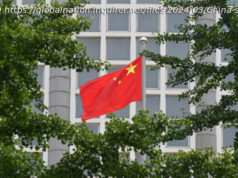Wants US to minimize tariffs on Chinese goods
As fears about an escalating trade war have continued to hammer stocks on Thursday, now that Daimler has become the first company to slash guidance blaming the trade spate between the US and China for its poor forecast (who knows what the real cause is), Market News International (MNI) reported that Chinese trade officials have “quietly” approached the US to find a way to minimize punitive tariffs on Chinese goods.
The news comes after China again reiterated that it would retaliate if President Trump slaps 10% tariffs on some $200 billion in Chinese goods, something he threatened to do earlier this week. In its latest communique, China said it is “fully prepared” to respond to any new list of US tariffs, according to a spokesman for the Commerce Industry, who added that China will use “a combination of quantitative and qualitative measures” to strike back at the US. Meanwhile, India followed in the European Union’s footsteps by raising tariffs on a slew of items, including walnuts, almonds, boric acid, apples, diagnostic reagents and some hot-rolled coil products.
India also joined the global trade war, and in retaliation to US tariffs, increased its own tariffs to 70% on chickpeas and Bengal gram, according to Bloomberg .
“The increase in tariffs is a message to the U. S. administration to take concerns of other nations seriously,” said Sachin Chaturvedi, director general at New Delhi-based think tank Research and Information System for Developing Countries. “Now this is unlikely to remain confined to a tariff war and will escalate to non-tariff measures as well.”
Just like their Chinese peers, Indian officials accused the Trump administration’s steel and aluminum import duties of being a violation of global trade rules. India, which the Treasury placed on a currency manipulation watchlist earlier this year, saw its trade surplus with the US shrink to $28 billion in 2017, marginally lower than the $30.8 billion from 2016.
As Bloomberg points out, higher import duties by the US could hurt the Indian export market, as well as economic growth more broadly at a time when foreign investors are pulling their money from emerging markets.
“The U. S. is being a bully right now and the only way out is to come to the negotiating table,” said Biswajit Dhar, a professor at the New Delhi-based Jawaharlal Nehru University. “Responses of partner nations are adequate enough to force the U. S. to do that.”
Earlier this week, the EU triggered the first phase of retaliation against the US over its metals-import tariffs by raising levies on key US products. Canada’s retaliatory measures will begin in July, and Mexico and other nations have also announced that they would respond. But China and Europe are planning to send a message about protectionism during a “high-profile dialogue” to be held June 25.
“The US abuses tariffs to trigger trade wars everywhere around the globe and that will severely damage the world trade order, hurt the interests of trading partners, and also hurt its domestic companies and people,” Ministry of Commerce spokesman Gao Feng said at a regular briefing in Beijing on Thursday. The US “always uses other nations as scapegoats for their own problems” he said.
Those remarks come after the White House late Tuesday published a scathing report accusing China of “economic aggression” and detailing China’s strategies for acquiring US intellectual property and violating US export laws. Both China and the US have promised to impose tariffs on billions of dollars in goods next month. While the two sides had initially held “positive, constructive” negotiations, it’s unclear whether the two sides are still even talking.






